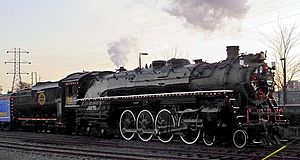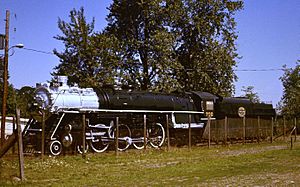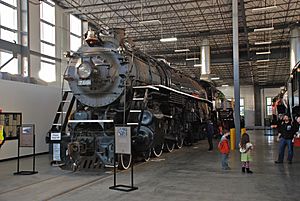Spokane, Portland and Seattle 700 facts for kids
Quick facts for kids Spokane, Portland and Seattle 700 |
|
 |
|
| SP&S No. 700 standing idle waiting to start a Christmas excursion in December 2005 | |
| Power type | Steam |
|---|---|
| Builder | Baldwin Locomotive Works |
| Serial number | 62171 |
| Build date | May 1938 |
| Configuration | 4-8-4 |
| UIC classification | 2′D2′ h2 |
| Gauge | 4 ft 8 1⁄2 in (1,435 mm) standard gauge |
| Driver diameter | 77 in (1,956 mm) |
| Length | 110 ft 6 in (33.68 m) |
| Axle load | 77,200 lb (35,000 kg; 35.0 t) |
| Weight on drivers | 294,500 lb (133,600 kg; 133.6 t) |
| Locomotive weight | 485,820 lb (220,360 kg; 220.36 t) |
| Locomotive and tender combined weight | 865,520 lb (392,590 kg; 392.59 t) |
| Fuel type | Bunker oil |
| Fuel capacity | 6,000 US gal (23,000 L; 5,000 imp gal) |
| Water capacity | 20,000 US gal (76,000 L; 17,000 imp gal) |
| Boiler pressure | 260 lbf/in2 (1.79 MPa) |
| Fire grate area | 115 sq ft (10.7 m2) |
| Superheater area | 2,095 sq ft (194.6 m2) |
| Cylinders | Two |
| Cylinder size | 28 in × 31 in (711 mm × 787 mm) |
| Valve gear | Walschaerts |
| Valve type | Piston valves |
| Power output | 5,000 hp (3,700 kW) |
| Tractive effort | 69,800 lbf (310.49 kN) |
| Factor of adhesion | 4.16 |
| Nicknames | "The Lady" "The First Lady of the Northwest" |
| Delivered | June 21, 1938 |
| First run | May 1938 (revenue service) |
| Last run | December 2014 (excursion service) |
| Retired | May 20, 1956 (revenue service) |
| Restored | May 15, 1990 |
| Current owner | The City of Portland, Oregon |
| Disposition | Undergoing 1,472-day overhaul at the Oregon Rail Heritage Center, based in Portland, Oregon |
|
Spokane, Portland and Seattle Railway Steam Locomotive
|
|
| NRHP reference No. | 05001557 |
| Added to NRHP | January 25, 2006 |
The Spokane, Portland & Seattle 700 is a very special steam locomotive. It is the only one of its kind, an "E-1" class 4-8-4 "Northern" type, that still exists. It's also the only original steam locomotive left from the Spokane, Portland and Seattle Railway. This powerful engine was built in May 1938 by the Baldwin Locomotive Works. It looks a lot like the "A-3" Northern locomotives built for the Northern Pacific Railway, but the SP&S 700 burns oil instead of coal.
For many years, the Spokane, Portland and Seattle Railway (SP&S) used older, second-hand trains. Finally, its parent companies, Great Northern Railway and Northern Pacific Railway, allowed SP&S to buy new locomotives. This included three E-1 class Northern locomotives (numbers 700, 701, and 702) for passenger trains. They also bought six Z-6 class Challengers (4-6-6-4s) for moving freight.
After it stopped regular service in 1956, the SP&S 700 was given to the City of Portland, Oregon in 1958. It was on display at Oaks Amusement Park until 1987. Then, it was moved to a private area so people could continue working to get it running again. Since 1990, it has made special trips called "excursions." In 2012, the 700 moved to a new home, the Oregon Rail Heritage Center, where the public can see it.
Contents
The Early Years: Working on the Railroad
The SP&S 700 was delivered on June 21, 1938. It joined locomotive 702 in pulling overnight passenger trains. These trains traveled between Spokane and Vancouver, Washington, following the north side of the Columbia River. Locomotive 701 was used as a backup and for pulling freight trains.
At first, these large Northern locomotives could not reach Portland, Oregon. This was because the railroad's turntable, which turns locomotives around, was too small for them. The 700s finally started going to Portland in 1944.
By 1947, new changes were happening in the railroad world. The Great Northern Railway began using diesel engines for its main passenger train, The Empire Builder. The SP&S also started buying diesels around this time. For a few months, before the new diesel trains arrived, the 700s pulled the Portland part of the Great Northern's Empire Builder and the Northern Pacific's North Coast Limited.
In 1947, the 700 had an accident and fell on its side while pulling a passenger train in Washington.
Through the late 1940s and early 1950s, the E-1 locomotives continued to pull passenger trains that were not the main ones. But by 1954, diesel engines had completely taken over passenger service. The E-1s were then used to pull freight trains until 1955.
A Fond Farewell to Steam
On May 20, 1956, the SP&S 700 made its very last passenger trip. It was cleaned up, and its normally grey smokebox was painted silver for the occasion. This special trip was called the Farewell To Steam run. The train had 21 cars and carried 1,400 passengers from Portland, Oregon to Wishram, Washington, deep in the Columbia Gorge. Then, it returned to Portland.
After this final trip, the 700, along with locomotives 701, 702, and other SP&S engines, were planned to be scrapped. However, the Union Pacific Railroad offered to donate a steam locomotive to the city of Portland, Oregon. Not wanting to be outdone, the SP&S offered to donate the 700. So, the SP&S 700 and another locomotive, OR&N 197, were moved to Oaks Amusement Park near the Willamette River in 1958. Later, SP 4449 also joined them, and they stayed there for almost 20 years.
Life at Oaks Park

For nearly two decades, the 700 and the other two locomotives sat behind fences. They slowly started to rust and fade. A dedicated employee from the Southern Pacific Railroad, Jack Holst, helped save them from becoming completely useless. Mr. Holst regularly visited the locomotives. He made sure their bearings and rods were well greased and oiled. Sadly, Mr. Holst passed away in 1972. This was before the first locomotive, SP 4449, was moved from Oaks Park and restored.
In 1975, a 15-year-old named Chris McLarney started working on the 700. He cleaned and oiled different parts. In 1977, he started the Pacific Railroad Preservation Association (PRPA). This group helped support the work to preserve the locomotive.
Between 1987 and 1989, the SP&S 700 was moved from Oaks Park. It went to the Southern Pacific's Brooklyn Roundhouse in southeast Portland. There, the restoration work continued. With help from many people and the Burlington Northern Railroad, the No. 700 was running again on May 15, 1990.
Adventures Since 1990
The 700 is the third largest operating steam locomotive in the United States. It is expensive to run and insure. However, since its restoration on May 15, 1990, it has made several special trips.
One historic trip was in 2005. The 700 teamed up with SP 4449 for a "doubleheader" journey. They traveled from Portland, Oregon to Wishram, Washington and back. This happened during the 2005 National Railway Historical Society national meeting. In 2002, the 700 also made a "Steam across Montana" trip. It went from Sandpoint, Idaho to Billings, Montana and back.
The SP&S 700 was even disguised once! It looked like Northern Pacific #2668. This was easy to do because the SP&S E-1 design is almost exactly the same as the NP A-3 class. The only main difference is that the SP&S Northerns burned oil, while the NP's burned coal.
On January 25, 2006, the 700 was added to the National Register of Historic Places. It was recognized as the Spokane, Portland and Seattle Railway Steam Locomotive.
A New Home and Ongoing Care

Until June 2012, the 700 and its two companion locomotives lived at the Brooklyn Roundhouse. The City of Portland was renting the roundhouse from its owner, Union Pacific Railroad (UP). But the railroad announced plans to tear down the roundhouse. They wanted to expand their yard. This meant the engines needed a new place to live.
The Oregon Rail Heritage Foundation, with a lot of help from the City of Portland, raised money for a new center. This new place would be for restoring trains and for visitors. It was built next to the Oregon Museum of Science and Industry. The goal was to give the city's steam locomotives a permanent home that the public could visit. This happened before the old roundhouse closed.
Building the new Oregon Rail Heritage Center started in October 2011. On June 26, 2012, the 700 and the other two locomotives were moved to the site of their new enginehouse. They were moved inside on July 28, once the building was finished. The Oregon Rail Heritage Center opened to the public on September 22, 2012.
The locomotive stopped running in late 2015 for a very important inspection. This is a 1,472-day inspection required by the Federal Railroad Administration (FRA). Since then, dedicated volunteers have been working hard to inspect, repair, and put the locomotive back together. In August 2020, the Emery Trust gave a grant of $35,000 to help finish the 700's rebuild. The locomotive might be back in action again later in 2021.
Images for kids
-
SP&S No. 700's NRHP plaque
 | Isaac Myers |
 | D. Hamilton Jackson |
 | A. Philip Randolph |



